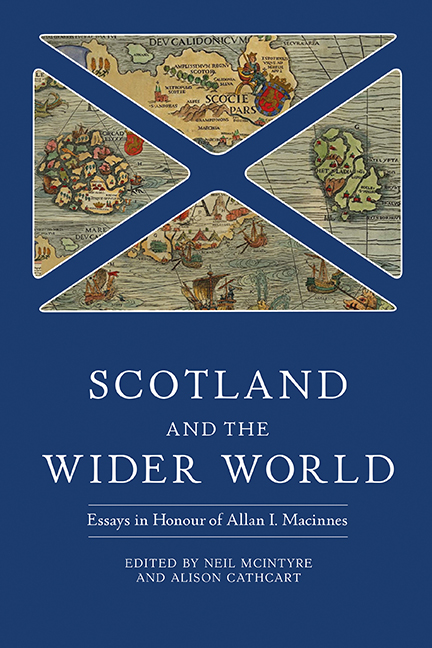Book contents
- Frontmatter
- Contents
- List of Contributors
- Preface
- List of Abbreviations
- 1 Covenants, Clans and Unions in Context: Celebrating the Scholarship of Allan I. Macinnes
- Part I Peoples and Cultures in Britain and Ireland
- Part II War, Religion and the House of Stuart
- Part III Union, Empire and Enlightenment
- List of Publications
- Index
- Tabula Gratulatoria
- Studies in Early Modern Cultural, Political and Social History
3 - Island Empire: James VI and I and the Isle of Man in an Archipelagic Context
Published online by Cambridge University Press: 26 May 2022
- Frontmatter
- Contents
- List of Contributors
- Preface
- List of Abbreviations
- 1 Covenants, Clans and Unions in Context: Celebrating the Scholarship of Allan I. Macinnes
- Part I Peoples and Cultures in Britain and Ireland
- Part II War, Religion and the House of Stuart
- Part III Union, Empire and Enlightenment
- List of Publications
- Index
- Tabula Gratulatoria
- Studies in Early Modern Cultural, Political and Social History
Summary
In one of his earliest publications, Allan Macinnes set out to ‘redress’ the imbalance in historiography that, he argued, had reduced analysis of Scotland's relations with the Isle of Man to ‘no more than brief asides in the general histories of Scotland’. The discussion began with the twelfth-century Kingdom of Man and the Isles and placed the Isle of Man within the wider context of Anglo-Scottish relations through to 1609–10, when James VI and I confirmed the Lordship of Man on William Stanley, sixth earl of Derby, after a long succession dispute. In a sense, this early article pointed to the approach that would be taken throughout his career: a Scottish focus, albeit within wider contexts, and an ongoing engagement with historiographical developments within the New British and Irish History, in particular the three-kingdoms approach to the civil wars of the mid-seventeenth century, the Willliamite revolution, and the emergence of Jacobitism in the later seventeenth and eighteenth centuries. Although his familiar stomping ground was the era of the civil wars through to Jacobite rebellions, Macinnes did discuss the concept of imperial monarchy articulated by James VI and I, which rejected any claims of the papacy to have spiritual jurisdiction within the three kingdoms and instead asserted that he, James, as king, was the ultimate source of both spiritual and temporal authority. Macinnes also engaged with the trend for studies of state formation within early modern history, repeatedly emphasising the lack of uniformity in the policies of James VI, who needed neither any ‘blanket policy’ for Gaeldom nor a one-size-fits-all approach to the establishment of colonies across the Atlantic. But to suggest, as Macinnes has, that James did not attempt to impose uniformity across his three kingdoms is, however, only a partial understanding of his policies. By focusing further on the Isle of Man and James's relationship to and governance of the island, this essay seeks to move beyond nationalist approaches to British and Irish history, or three kingdoms history, to a more nuanced, archipelagic appreciation of James VI and I and his island empire.
In the twelfth century, kings of Man and the Isles were important power brokers within the archipelago and were able to hire, or hire out, a significant maritime fleet or mercenary force.
- Type
- Chapter
- Information
- Scotland and the Wider WorldEssays in Honour of Allan I. Macinnes, pp. 34 - 48Publisher: Boydell & BrewerPrint publication year: 2022

